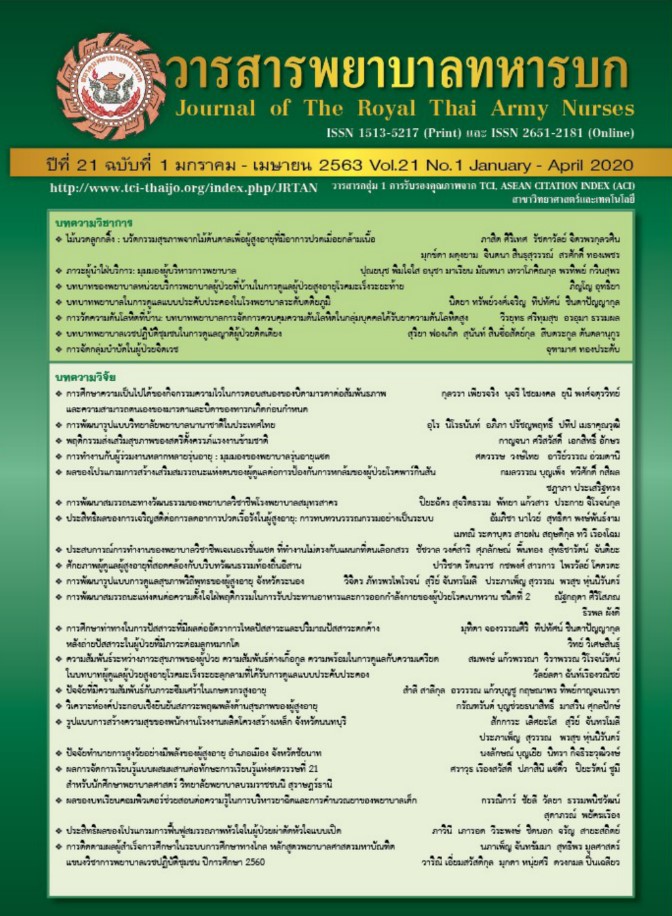Experiences of Transcultural Nursing Care in Arabic Wards of a Private Hospital
Keywords:
a private hospital, professional nurses, experiences, transcultural nursing careAbstract
The purpose of this research study aimed to describe experiences of being professional nurses in caring for Arabic patients in a private hospital. The methodology of this research applied on hermeneutic phenomenology by Heidegger. The study participants were 12 professional nurses experiencing in caring for Arabic patients at least 3 years. Data collection was used by in-depth interview along with tape recording and field notes. The data were then transcribed word-by-word and the content was analyzed based on van Manen’s methods. The results could be divided into 2 main themes, as follows: 1) In order to understand patients’ culture. i.1.1) Arabic people were hot-tempered and could be loud, 1.2) Arabic Men had the right of consent for any treatment, 1.3) Having cultures of food sharing, 1.4) Expecting to receive treatment results but not willing to co-operate very well and 1.5) Prioritizing their own beliefs and incorporating them in the treatment in the hospital 2) To care for Arabic patients, nurses needed to be aware i.e. 2.1) Checking evidence for claiming insurance at the embassy, 2.2) Necessarily giving up some activities during the fasting period, 2.3) nurses had to repeat themselves while explaining treatment methods, 2.4) Preparing female patients to get ready before each doctor visit and 2.5) Be treated like being at home so the caring procedures needed to be adjusted.
Downloads
References
2. U-Wattana P. Relationships between personal factors, workplace environments, transformational leadership of head nurses, and transcultural nursing competencies of professional nurses, private hospital, Bangkok metropolis. Royal Thai Army Nursing Journal; 2017; 18: 175-184. (in Thai).
3. Ajsontia J. Cross-cultural nursing and entry into the ASEAN community. Royal Thai Army Nursing Journal; 2016; 17 (1): 10-16. (in Thai).
4. Siriphan S. Cultural competencies of Thai nurses in care Service recipients living in multicultural areas. Pacific Rim International Journal of Nursing Research (2015); 19: 19-31. (in Thai)
5. Giger, J. N., and Davidhizar, R. E. Transcultural nursing: Assessment and intervention. 5th ed. St. Louis, MO: Mosby; 2008.
6. Douglas, et al. Standards of Practice for Culturally Competent Nursing Care: 2011 update. Journal of Transcultural Nursing 2011; 22: 316-333.
7. Ratsuwan S. Behavior of medical services in Thailand of tourists-oriented Health from the Middle East: perspectives from medical providers. Kasetsart Journal Applied Business (2017); 11:53-76.
8. Songwattana P. Cultural competencies of Thai nurses in care Service recipients living in multicultural areas. Pacific Rim International Journal of Nursing Research (2015); 19:19-31. (in Thai)
9. BoonKlam R. Role of nursing education institute towards ASEAN community. Journal of The Royal Thai Army Nursing ; 2014; 15 (3): 103-107. (in Thai)
Downloads
Published
How to Cite
Issue
Section
License
บทความหรือข้อคิดเห็นใดใดที่ปรากฏในวารสารพยาบาลทหารบกเป็นวรรณกรรมของผู้เขียน ซึ่งบรรณาธิการหรือสมาคมพยาบาลทหารบก ไม่จำเป็นต้องเห็นด้วย
บทความที่ได้รับการตีพิมพ์เป็นลิขสิทธิ์ของวารสารพยาบาลทหารบก
The ideas and opinions expressed in the Journal of The Royal Thai Army Nurses are those of the authors and not necessarily those
of the editor or Royal Thai Army Nurses Association.






